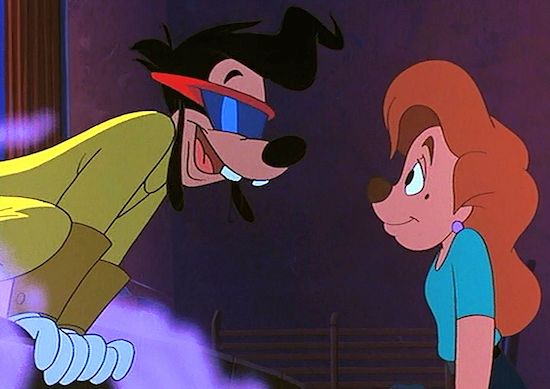A teenager runs through a golden field of wheat towards the sound of someone calling his name. In the distance he sees the object of his affections, Roxanne, waiting statuesque on a pillar, draped in white with Botticelli-red hair spooling out behind her. She leaps down, blowing bobbing dandelion seeds in his direction as they meet, lay on the ground and laugh together. It’s a blissful sequence, yet storm clouds gather and the teenager begins to transform, werewolf-like, screaming, limbs elongating and clothes tearing, voice changing, until suddenly he has become his worst nightmare: he is the spitting image of his father. And his father is, of course, famed talking dog, Goofy. The transformation is so complete that he even makes a “hyuck” noise, the distinctive Goofy laugh.
This is the harrowing opening scene to A Goofy Movie, released by Disney in 1995. Whenever I bring it up, it’s relatively rare that people have even heard of the film, let alone watched it. Often, they think I’m doing some kind of bit when I say it is one of my favourite films of all time.
For those who haven’t seen it, A Goofy Movie follows high school teen Maximilian ‘Max’ Goof (voiced by Jason Marsden) and his relationship with his dad, Goofy (voiced by Bill Farmer). Max is constantly aggravated by his father’s embarrassing behaviour, feels desperately uncool and wants to be noticed by the girl he fancies. And so, on the last day before the summer break, he hatches a plan with his two best mates, PJ and Bobby, dressing up as his musical idol Powerline and crashing the school assembly. This is a success in that Roxanne says yes when Max later asks her out on a date – but it also causes the Principal of the school to call up Goofy and tell him that his son incited a riot among his peers and, if allowed to continue on this path, Max is likely to end up in a gang and, eventually, on the electric chair. And so, troubled by the outlook for his purportedly at-risk son, Goofy insists that Max accompany him on a cross-country roadtrip to go fishing, like Goofy and his own father once did. In turn, a miserable Max lies to Roxanne about why he can no longer make their date, claiming his father is old friends with Powerline. What follows is chaos, resentment and touching depictions of the angsty growing pains between parent and child. At one point there is awkward silence after Goofy reminisces that Max used to say “I love you” to him back when he was a child.
In the decades since A Goofy Movie was released, it has garnered a cult following. There are people doing live action remakes of songs on YouTube (this one has over seven million views), Buzzfeed articles have been written that are genuinely called things like ‘Max From “A Goofy Movie” Is Now Insanely Hot’, when discussing a rendering of a cartoon character. Then there are new runs of merchandise, and active subreddits where people continue to discuss the film and all its nuances. Gatherings of the cast as well as performances of the film’s songs have a tendency to go viral. There are joke-y tweets and reviews about how it is the Greta Gerwig film, Ladybird. It was a piece of Goofy Movie fan-art that gave birth to the incredible meme, “damn, bitch, you live …



